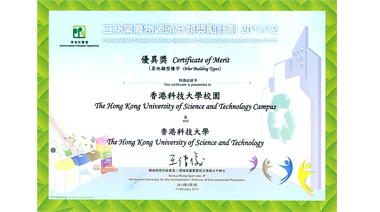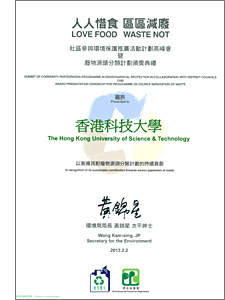|
Environmental Awards
-
HKUST was awarded the "Class of Excellence Wastewi$e Label" in 2012 at the Hong Kong Awards for Environmental Excellence, which recognized our strong commitment to environmental protection and waste reduction.
-
HKUST received “Certificate of Merit” at the Hong Kong Awards for Environmental Excellence Sectoral Awards 2012 in the Public Organizations and Utilities sector.
-
HKUST joined the Scheme on Source Separation of Commercial and Industrial Waste 2011/12 organized by the Environmental Protection Department and received a "Merit Award".
-
At the "Love Food, Waste Not" community participation program summit, a certificate was presented to HKUST to recognize our sustainable contribution towards source separation of waste over the past year.
|
.jpg) |
 |
 |
Waste Minimization and Recycling
Hong Kong's three landfills will reach full capacity in 2018. Everyone has a responsibility and a part to play in reducing waste and promoting recycling. The concept of the "4Rs of waste minimization" widely adopted at HKUST refers to the acts of reducing, reusing, recycling and replacing. The waste minimization goals at HKUST aim to optimize waste reduction and encourage recycling activities on campus, activities which are fundamental to most waste management programs.
- In 2012, HKUST achieved two Wastewi$e goals. We collected 278 glass bottles from our caterers, 43 percent higher than our target of 194 pieces. 85 rechargeable batteries were collected, a figure which was also much higher than our target.
- There was a 37 percent increase in the quantity of plastic bottles collected for recycling and a 40 percent increase in the number of aluminum cans collected.
|
Breakdown of Items Collected for Recycling in 2012
|
Aluminum cans
|
616kg
|
|
Plastic bottles
|
2,320kg
|
|
Waste paper
|
73,390kg
|
|
Fluorescent tube & light bulbs
|
2,588pcs
|
|
Printer cartridges
|
1,696pcs
|
|
Used CDs
|
3,590pcs
|
|
Rechargeable batteries
|
85pcs
|
|
 |
Every year, the FMO collaborates with the SAO, the Staff Association and the Student Union to collect second-hand items to donate to charity and those in need. The following activities were conducted in 2012:
- A total of 10 tonnes of second-hand items were collected and donated.
 During the student hall summer checkout period, a recycling campaign was held to collect recyclable items. Donations include 939kg of clothing, 1,078kg of waste paper and 183kg of living commodities. During the student hall summer checkout period, a recycling campaign was held to collect recyclable items. Donations include 939kg of clothing, 1,078kg of waste paper and 183kg of living commodities.
- Residents were also encouraged to donate electronic appliances at service counters inside the student halls. In total, 64 items were donated to charities.
- Five sets of used and functional computer hardware and accessories were collected for the Busy Bee Kindergarten on campus.
- A total of 166 used books were collected from student lockers. The proceeds from the sale of these books went to supporting the University Student Amenities and Activities.
 A total of 432 O'camp tees were received and sent to a green group for recycling. A total of 432 O'camp tees were received and sent to a green group for recycling.
- Used mooncake boxes were collected for recycling after the Mid-Autumn Festival.
- The HKUST Garage Sale is a popular biannual event organized every June and December by the FMO. With over 190 tables selling all manner of used or unwanted goods, the event is run on a nonprofit basis and all surplus funds are donated to charity. The event promotes the "5Rs" message to the HKUST community: Recycle, Reuse, Reduce, Replace and Rethink.
- The three sets of recycling bins designed by Green Ambassadors are in place areas of the Student Halls and on the Live Green floor of Hall 6. The bins promote recycling among student residents.
|
Food Waste Management
Every day, over 3,500 tonnes of food waste is produced in Hong Kong. The Hong Kong government has launched a Food Wise campaign to encourage all sectors of society to reduce food waste, with a target of reducing waste by 10 percent in three years time.
|
-
At HKUST, efforts are ongoing to promote the "Less Rice" initiative, encouraging students and staff to reduce food waste at source.
-
Since 2003, a food waste composting machine has been installed in the LG1 canteen to turn food waste from campus catering kitchens (the LG1 service canteen and G/F restaurant) into fertilizer and soil conditioner. The fertilizer produced is used on campus for our horticulture and organic farming activities on LG7. In 2012, 7,000kg of food waste was collected and composted.
|
 |
|
Chemical Waste Management
 The disposal of hazardous waste is strictly controlled across HKUST. A comprehensive chemical waste management program under the Health, Safety and Environment Office (HSEO) aims to effectively manage chemical waste produced on campus. All unwanted chemical waste is collected and disposed of at the Environmental Protection Department (EPD) designated Chemical Waste Treatment Plant in accordance with existing regulations. In 2012, a total of 37,860 litres of various streams of hazardous chemical waste were picked up from laboratories and workshops for disposal.
New legislation was introduced in 2012 under the Waste Disposal Ordinance which controls the disposal of clinical waste. HKUST follows the "Code of Practice for the Management of Clinical Waste", in which dead animal bodies are now classified as clinical waste.
To minimize the amount of usable chemicals being disposed, HSEO's Chemical Exchange Program encourages users to donate unwanted chemicals as free "giveaways" to eligible request-makers within HKUST and at other universities. Last year, 2.5 litres of liquid and 2.7 kg of solid chemical reagents (a total of 14 items) were recycled through the program.
|